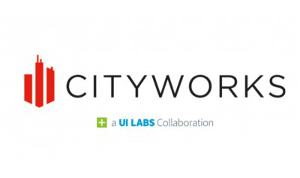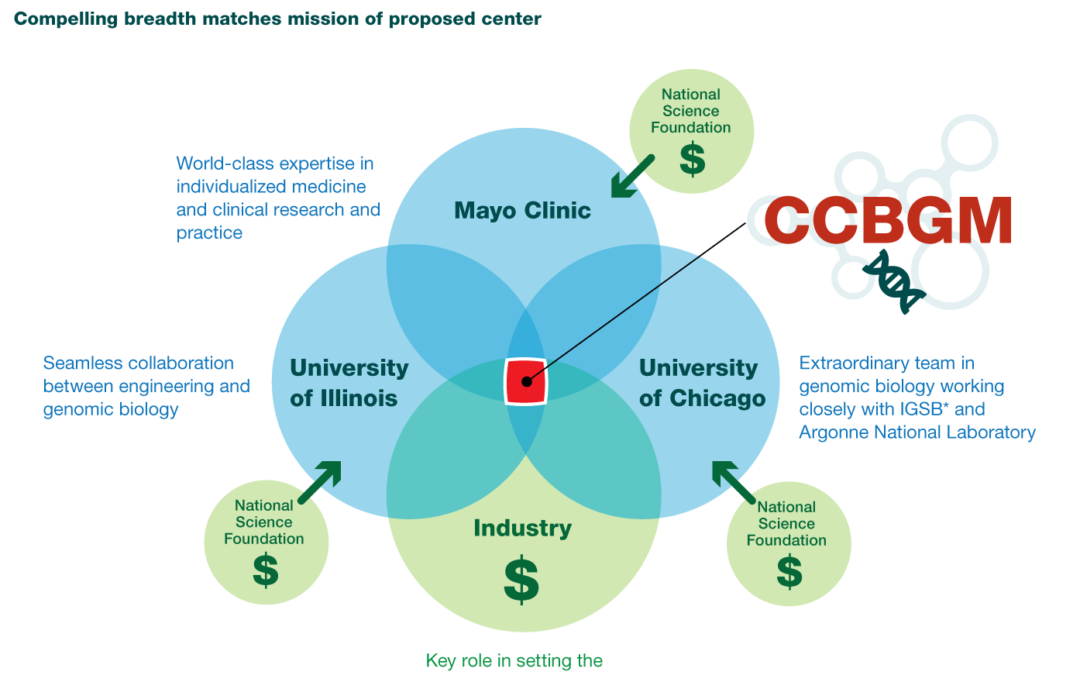By Professor Ravishankar Iyer, Professor of Engineering at the University of Illinois at Urbana-Champaign,
Dr. Liewei Wang, Professor of Molecular Pharmacology and Experimental Therapeutics at Mayo Clinic Rochester,
Professor Kevin White, Director of the Institute of Genomics and Systems Biology at the University of Chicago.
As the use of computers to model experiments and outcomes becomes increasingly indispensable to scientific discovery across disciplines, Illinois finds itself at the epicenter for next-generation breakthroughs in medicine, physical sciences, and computer science. Thanks to its world-class strengths in supercomputing and cutting edge research in the physical and biological sciences, Illinois has emerged as a critical player in the federal government’s efforts to use supercomputing to accelerate economic development and healthcare through scientific advances.
The University of Illinois at Urbana-Champaign, the University of Chicago, and Mayo Clinic have teamed up to create a collaborative research center called the Center for Computational Biotechnology and Genomic Medicine (CCBGM). This center brings the resources of U. of Illinois, Mayo, and U. of Chicago in computational and biological sciences together with a broad range of industry partners [1] to perform collaborative research in genetics and personalized medicine of interest to both industry and academia. The Center leadership is applying for designation and funding as a National Science Foundation (NSF) Industry/University Cooperative Research Center (I/UCRC). It is anticipated that the formal kickoff of CCBGM will take place in 2016.
Together, CCBGM’s researchers have expertise in areas of biology ranging from human genomics to crop and animal sciences, and broad expertise in computing systems and algorithms. The University of Illinois is contributing top-rate computer engineers and scientists from its Coordinated Science Laboratory, Electrical and Computer Engineering department, and Computer Science department and leading genomic biologists with high-performance computing experience from its Woese Institute for Genomic Biology. Mayo Clinic is offering its Center for Individualized Medicine’s world-class expertise in personalized medicine and clinical research. The University of Chicago is drawing on the extraordinary team in genomic biology it has at its Institute for Genomics and Systems Biology and at the Argonne National Laboratory.
The Center will address an array of problems in biology and medicine that cannot be solved without significant innovation in computational systems. Specifically, CCBGM’s mission is to advance “big data” technologies to the point that we can fully analyze and exploit the massive amounts of genetic and other biological data that are becoming available. In pursuing that mission, CCBGM is also attracting research investment from companies around the world. Industry partners will have access to teams composed of students, postdocs, and faculty in computing systems, applications, bioinformatics, multi-omics, biotechnology, and health from all three research partners. This multi-institutional and cross-sector collaboration will play a critical role in strengthening and expanding the state’s biomedical biotechnology cluster, which the Illinois Science and Technology Roadmap highlighted as a core strength of Illinois’ research community.
The Center will be unique in its comprehensive approach to big “multi-omics” [2] data, from analytics to actionable intelligence. The potential rewards of success are enormous. One particular exciting aspect of the Center’s work will be its eventual impact on the practice of individualized precision medicine. Through innovation in the computational architectures and algorithmic techniques used to handle genomic data, CCBGM’s work will take us much closer to the vision of being able to analyze an individual patient’s genetic data in a manner that provides accurate, “real-time” information on medical conditions. To meet that challenge, CCBGM will pursue accelerated and accurate methods of genomic analysis, ways to merge different modalities of data, and strategies for designing computing systems to more efficiently store and process data.
Another major focus of research will be efforts to engineer new computational methods for biotechnology. Multi-omics-derived biotechnology approaches in pharmaceuticals, agriculture and consumer products are expanding rapidly. One current limit to their potential is a need for computational tools for “big data” in genomic and genetic data analysis, biochemistry, imaging, compression, encryption and data transfer. The center will address these needs using biological modeling, algorithm design, interface development and iterative optimization in direct collaboration with cutting-edge biology researchers analyzing real data.
Earlier this year, the Obama administration proposed $215 million for the Personalized Medicine Initiative to accelerate research in this area. As the momentum and funding for personalized medicine research increase, CCGBM and Illinois will be at the forefront of the discipline.
1 Companies that are potentially interested in CCBGM are encouraged to visit the Center’s website at ccbgm.illinois.edu for further information and contact details.
2 Multi-omics is a collective term used to define biological disciplines which explain the structure, function, and dynamics of an organism or organisms by studying these phenomena at the molecular level.
Watch and Listen
Pharmacogenomics at Mayo Clinic: the right drug, at the right dose, for the right patient
Transforming Cancer Research: The Genomic Data Commons at the University of Chicago
Learn
- Center for Computational Biotechnology and Genomic Medicine (CCBGM): a collaborative environment addressing pressing genome-based challenges
- The University of Illinois’ Coordinated Science Laboratory: a premier, multidisciplinary research laboratory focusing on information technology at the crossroads of computing, control and communications
- The Carl R. Woese Institute for Genomic Biology: dedicated to transformative research in agriculture, human health, the environment, and energy use and production
- Mayo Clinic’s Center for Individualized Medicine: solving the clinical challenges of today and tomorrow
- The University of Chicago/Argonne National Lab Institute for Genomics and Systems Biology: an engine for discovery utilizing the latest approaches in genome analysis
- University of Chicago’s Genomic Data Commons: first-of-its-kind facility expanding access to large-scale cancer genomic data
- NSF’s Industry & University Cooperative Research Program (I/UCRC)
More News
- UI Labs to announce 2nd program, CityWorks, focused on urban infrastructure
- U. of I. trustees approve new medical school
- Urban Labs Innovation Challenge to focus on Chicago
- Durbin proposes American Innovation Act to fund scientific research
- WBC, ISTC and UI Labs release manufacturing innovation hub request for information (RFI)
- Two Chicago area students honored at White House Science Fair
Illinois Innovation Network Featured Resource:
Illinois Innovation Network Featured Resource: Each month, the Illinois Science and Technology Coalition features a service or resource available to innovators and entrepreneurs in the state of Illinois on the Illinois Innovation Network. To learn more and add your resource to the Network, click here.  The Illinois Business Immigration Coalition provides a voice for Illinois businesses in support of common sense immigration reform that supports Illinois’ economic recovery, provides Illinois companies with both the high-skilled and low-skilled talent they need, and promotes the integration of immigrants into our economy as consumers, workers, entrepreneurs and citizens. Continue reading at Illinois Innovation Network
The Illinois Business Immigration Coalition provides a voice for Illinois businesses in support of common sense immigration reform that supports Illinois’ economic recovery, provides Illinois companies with both the high-skilled and low-skilled talent they need, and promotes the integration of immigrants into our economy as consumers, workers, entrepreneurs and citizens. Continue reading at Illinois Innovation Network![]()


